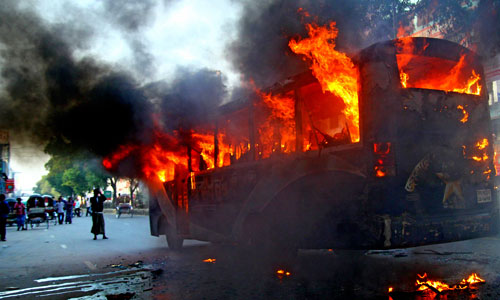A Muslim-majority country is in danger of falling into the hands of Jihadi Islamists.
No, I am not referring to Libya, Yemen, Iraq or Syria as we have become accustomed to reading about almost every day.
I am talking about Bangladesh, a tiny democracy of 150 million people, mostly Muslim, where the constitution itself bars any religious party from contesting elections.
For over a month the opposition Bangladesh National Party (BNP) and its Islamist ally the Jamaat-e-Islami have launched a countrywide strike and blockade of roads and railways, with the express aim of overthrowing the secular government of Prime Minister Sheikh Hasina.
The violence and arson attacks by Islamist activists in the opposition alliance have severely disrupted public life.
So far, 82 people have died while hundreds have been injured.
Over 1,000 buses, trucks and vans have been firebombed, costing the economy nearly $10 billion, according to business leaders.
On Sunday the violence reached a new phase with opposition protestors derailing a train.
Earlier, two gasoline bomb attacks on buses killed 16 people forcing the government to ban all “night buses” — long-distance buses that operate at night.
However, other than a New York Times editorial, “Bangladesh on the Brink”, there has been little or no coverage in the world media of the jihadi onslaught in Bangladesh.
Not even in next-door India.
The Times editorial admonished both the government and the opposition, but also raised the issue of Islamists, noting: “The Bangladesh National Party (BNP) must rein in its violent base and sever ties with the Jamaat-e-Islami party and its street-power tactics.”
Jamaat-e-Islami has well-established links with international militant jihadist groups and has been accused of harbouring and training fighters from Afghanistan and Pakistan.
It has also called for arming and training Rohingya refugees from Myanmar.
The chaos in Bangladesh is rooted in last year’s general elections that were boycotted by BNP, which is the major opposition party, and the Jamaat–e-Islami (an affiliate of the Egyptian Muslim Brotherhood) on the grounds they were not being held under a caretaker government, as required by an amendment to Bangladesh’s constitution.
This amendment called for the sitting government to resign and hand over power to a caretaker government, which was then given the responsibility of holding the general elections.
However in mid-2011, the country’s supreme court declared this amendment illegal.
As a result, the January, 2014 elections were held without the government of Prime Minister Hasina stepping aside.
Though she tried to persuade the opposition to participate in the elections, the BNP refused and the jihadi element within the opposition not only boycotted the polls, but also committed acts of violence in which many voters were killed.
A year later, the violence is still going on.
Should the current opposition movement succeed in destabilizing the government and the balance of power shifts in favour of the BNP-Jamaat alliance, one can expect a Syria-like situation with militants from different parts of the world exploiting the power vacuum in Bangladesh.
While the immediate impact of the Islamization of the country will be felt in Bangladesh, before long it will spread to Myanmar, Thailand, India, and the rest of the region.
Perhaps then, too late, the rest of the world will notice.
Source: Torontosun










